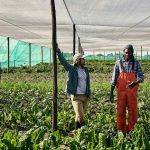AgriTech startup Apeel secures $30M in funding to fight the $2.6 trillion-dollar global food waste and help smallholder farmers in emerging markets join the global food system

Smallholder farmers managing up to five hectares produce more than 50% of the global fruit supply1, yet agricultural workers still make up 65% of all poor working adults and many smallholder farmers suffer from hunger and extreme poverty. Fresh fruits and vegetables offer SHFs much larger income opportunities than staple crops, and demand for fresh produce is increasing globally.
The challenge is that growing something valuable is only beneficial if the farmer can access a market with a buyer. Without access to a refrigerated supply chain, much of what a Smallholder farmer produces can only reach small local markets where the supply of locally grown crops often far exceeds demand. Because of perishability, these market dynamics lead to systemic poverty, significant amounts of food loss and waste, and even food insecurity for those who make their livelihoods from farming.
Enter Apeel, a San Francisco-based AgriTech startup on a mission to create a more sustainable global food system by using the power of nature to enable longer-lasting produce that fights food waste from farm to kitchen. Apeel uses nature’s own technology to make fruits and vegetables last longer in order to drastically reduce food waste—from farmer to grocer to kitchen tables around the world.
Yesterday, Apeel announced it raised $30 million in new funding from the International Finance Corporation (IFC), Temasek, and Astanor Ventures. Apeel will use its new funding and technology to help smallholder farmers in emerging markets, who suffer from some of the highest levels of food insecurity and waste, extend crop shelf life and gain access to new markets, including the U.S. and Germany.
Founded in 2012 by James Rogers, Apeel Sciences is fighting the $2.6 trillion-dollar global food waste crisis by utilizing advances in materials science to prevent waste in the first place. The company’s plant-derived solution for fresh food providers doubles the lifespan of harvested fruits and vegetables even without refrigeration. It develops low-cost, natural technologies to help to eliminate food spoilage, reduce water and energy use, and preserve natural ecosystems.
“It’s a misconception that people go hungry because we don’t grow enough food. The issue is the intermittency of supply and an inability to convert perishable assets into economic value,” said James Rogers, Founder, and CEO of Apeel. “The harsh reality is that it is nearly impossible today for most smallholder farmers to get their produce to a marketplace that will pay for it before it spoils. Apeel was founded on the belief that we can improve food security around the world by using technology to create opportunities for those who have limited or no access to the global food system. The new funding from IFC, Temasek, and Astanor will enable us to not only give smallholder farmers more time to market their fresh produce but also greater access to higher-value markets previously out of reach because of inevitable perishability.”
Improving the livelihoods of smallholder farmers has been core to Apeel’s mission since day one. Founded in partnership with the Bill & Melinda Gates Foundation and the UK Government, Apeel’s plant-based technology was designed to extend the shelf life of fruits and vegetables produced by farmers without access to the refrigerated supply chains currently required to bring crops to market. The company spent the next several years bringing the technology to scale and establishing a global supplier base and retail network. Today, Apeel produce is available nationwide in the United States, Germany and other countries across Europe, leading to a 50% reduction of food waste on U.S. and EU store shelves, while also extending shelf-life in home, where rates of food waste are three times as high as retail. With new funding in line with its mission, Apeel is one step closer to realizing its vision of creating a more participatory food system where access to fresh produce, which is a natural resource, is synonymous with economic opportunities for smallholder farmers.




